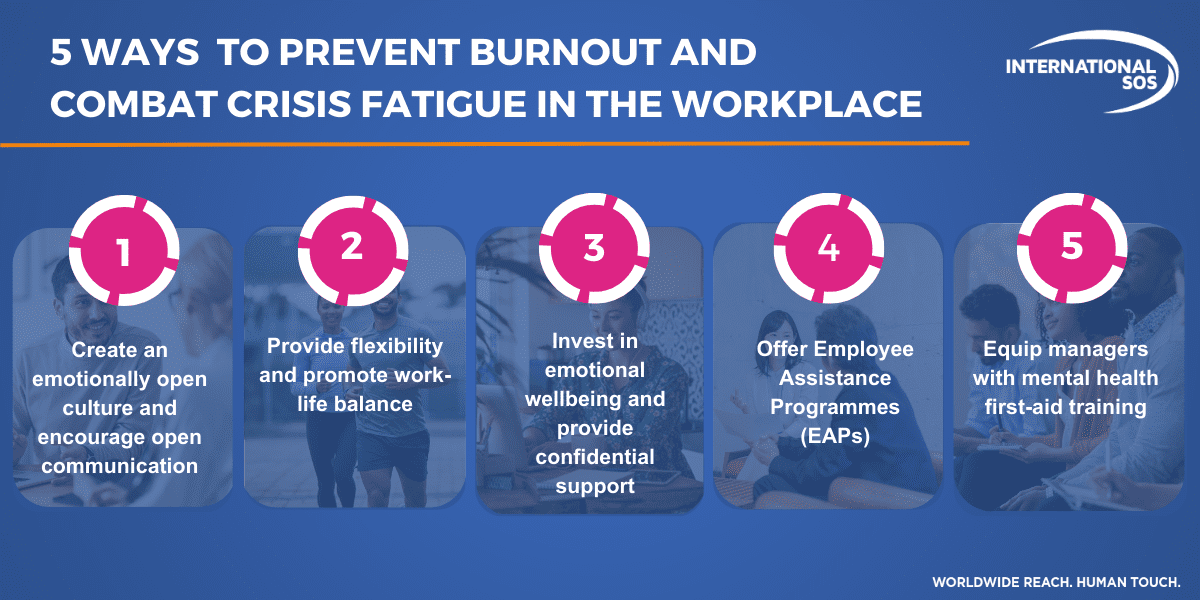While Blue Monday traditionally signifies a peak in winter blues and shines a light on Seasonal Affective Disorder (SAD), the current global landscape is far more complex. The prolonged exposure to crises, economic uncertainties and climate anxieties are creating a sustained strain on individuals. Concerns regarding crisis fatigue and burnout among the global workforce are also prompting organisations to re-evaluate their mental health support strategies and to prioritise proactive mental health support for employees.
The International SOS Risk Outlook 2024 data identifies burnout, the cost-of-living crisis and mental health concerns as the top risks to organisational wellbeing this year. Mental health emerges as a critical concern, as the pressures of burnout and financial difficulty can manifest in emotional and psychological distress. The survey data also underlines a growing understanding of the direct link between employee wellbeing and organisational success.
With 82% acknowledging the vital role of health and wellness policies in recruitment and retention and 77% see safeguarding employee wellbeing as a board-level priority.
- The World Health Organization also highlights that globally, an estimated 12 billion working days are lost every year to depression and anxiety at a cost of US$ 1 trillion per year in lost productivity.
- Burnout rates among the global workforce have nearly doubled in just two years, soaring from 11-18% to 20-40%, with many reporting burnout levels as high as 50%.
- This staggering data aligns with a recent McKinsey Health Institute study, revealing that 22% of employees across 30 countries are experiencing burnout symptoms at work.
- Despite a significant rise in global burnout rates, the perceived risk its impact will have in 2024 varies across regions. Globally, 80% of surveyed global senior risk professionals identifies employee burnout as the top threat to their organisation and workforce.
- Notably, this concern is most pronounced across the Middle East (93%), Oceania (88%), Africa (84%) and Americas (84%), which are exceeding the global average.
“The post-holiday return to work is known for its challenges and for many employees, this period can be a tipping point for exhaustion, chronic stress and burnout. Some may still be facing the lingering effects of the festive season, navigating financial pressures from rising bills after the holiday celebration. Heightened geopolitical uncertainties and ongoing global crises are also amplifying employee anxieties and creating a complex landscape for businesses navigating workforce wellbeing and productivity.
“Employee demands for strengthened mental health and wellbeing support within the workplace had been steadily increasing even before the recent succession of crises. This pre-existing trend has now acquired greater urgency amidst employee experiences of burnout and crisis fatigue. Blue Monday offers a timely opportunity for organisations to assess and strengthen workplace mental health initiatives. When employees feel supported and empowered to take care of their mental health, they are likely to be more engaged, focused and able to excel in their roles. Organisations that recognise this and prioritise on cultivating psychosocially safe work environments – from providing stress management workshops to flexible work arrangements, are not just doing the right thing, they are also making a strategic investment in their workforce’s potential.”
Dr Rodrigo Rodriguez-Fernandez, Global Health Advisor at International SOS
International SOS urges organisations to take action and implement proactive strategies to prevent burnout and combat crisis fatigue in the workplace:
- Create an emotionally open culture and encourage open communication: provide a safe space for employees to talk about their mental health and wellbeing.
- Encourage them to speak up if they are feeling overwhelmed or struggling.
- Provide flexibility and promote work-life balance: support flexible working arrangements that help employees to balance their work and personal lives.
- Promote regular breaks and empower employees to prioritise their wellbeing.
- Invest in emotional wellbeing: provide access to mindfulness sessions, and stress management training.
- Partner with certified mental health professionals to offer confidential counselling and support services.
- Offer employee assistance programmes (EAPs): consider providing support such as financial counselling services or benefits consultations to address anxieties surrounding economic uncertainties.
- Equip managers with mental health first-aid training: upskill managers to identify signs of distress and offer initial support to employees who may be struggling.
Like this?
Share it:
Beyond Blue Monday: Addressing Burnout and Crisis Fatigue in The Workplace is licensed under a Creative Commons Attribution-ShareAlike 4.0 International license. Quote Source: https://www.asiafitnesstoday.com/beyond-blue-monday-addressing-burnout-and-crisis-fatigue-in-the-workplace/




Facebook Comments